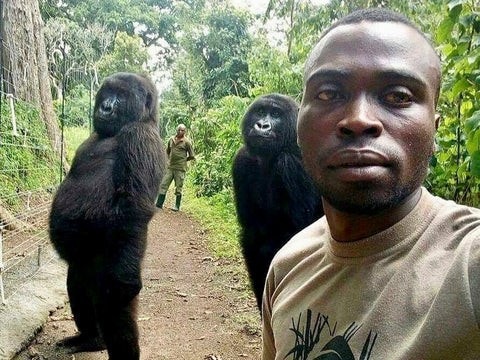Gorillas, with their striking resemblance to humans and complex social behaviors, often capture our imaginations. Their intelligence and gentle nature, as highlighted in documentaries and wildlife programs, might lead some to wonder: could a gorilla be a pet? While the idea of sharing your home with one of these magnificent creatures might seem intriguing, the reality is far more complex and definitively answers this question with a resounding no.
Gorillas, the largest living primates, share a significant portion of our DNA, making them fascinating subjects of study and admiration. They exhibit a range of human-like traits, from expressive emotions to tool use. Living in structured family groups called troops, led by a dominant silverback, gorillas display intricate social dynamics. They are herbivores, consuming up to 40 pounds of vegetation daily to sustain their massive bodies, which can weigh up to 440 pounds and stand up to 6 feet tall. Despite their size and strength, gorillas are considered gentle giants, playing a crucial role as forest regulators in their natural rainforest habitats. However, all four subspecies of gorillas – the cross river gorilla, mountain gorilla, western lowland gorilla, and eastern lowland gorilla – are critically endangered, facing threats from habitat loss and human encroachment.
Understanding Why Gorillas Are Not Pets
While their gentle nature in the wild is often emphasized, it’s crucial to understand that gorillas are wild animals with immense physical power, complex needs, and unpredictable behaviors in a domestic setting. Several key factors make keeping a gorilla as a pet not only impractical but also dangerous and unethical:
Immense Strength and Potential Danger
Gorillas, despite their generally peaceful disposition, possess incredible strength. An adult silverback can be many times stronger than a human. While they are not inherently aggressive towards humans in their natural habitat unless threatened, their sheer size and power pose a significant risk in a domestic environment. Even unintentional actions from a gorilla, if it were to become startled or playful, could result in serious injury or even death to a human. Their strength is simply beyond what any domestic setting can safely manage.
Complex Social and Environmental Needs
Gorillas are highly social animals thriving in complex troop structures within specific rainforest environments. Providing adequate social interaction and environmental enrichment for a gorilla in a home environment is virtually impossible. They require large spaces to roam, specific vegetation for their diet, and the social dynamics of a troop, which cannot be replicated in a domestic setting. Confining such an intelligent and social creature to a house would lead to severe stress, behavioral problems, and a drastically reduced quality of life for the animal.
Specialized Dietary Requirements
Gorillas have a very specific herbivorous diet consisting of large quantities of foliage, fruits, and insects in the wild. Replicating this diet in captivity is challenging and expensive. They require a constant supply of fresh vegetation to meet their nutritional needs and maintain their health. Providing an adequate and balanced diet for a gorilla pet would be an immense undertaking, requiring specialized knowledge and resources.
Conservation Status and Legal Restrictions
All gorilla subspecies are critically endangered, and their populations are declining. Removing a gorilla from its natural habitat to be kept as a pet is not only unethical but also illegal in most countries. International laws and conservation efforts are in place to protect these endangered primates. Keeping a gorilla as a pet would directly contribute to the threats they already face in the wild and undermine conservation efforts.
Ethical Considerations
Beyond the practical and legal obstacles, the ethical implications of keeping a gorilla as a pet are paramount. Gorillas are intelligent, sentient beings with complex emotional lives. Confining them to a domestic environment for human companionship is inherently selfish and disregards their well-being. They belong in their natural habitats, contributing to the ecological balance of the rainforest and living according to their natural instincts.
Appreciating Gorillas from a Distance
Instead of considering gorillas as pets, our focus should be on appreciating them in their natural environment and supporting conservation efforts to protect them. Learning about their fascinating behaviors, social structures, and ecological importance can foster a deeper respect for these magnificent creatures. For those who are captivated by gorillas, plush toys can offer a harmless and enjoyable way to express that admiration, without contributing to the exploitation of endangered species.
Ultimately, while the thought of a gorilla as a pet might stem from admiration and fascination, it’s crucial to recognize the reality. Gorillas are wild animals, not domesticated companions. Their well-being, conservation status, and the safety of humans all dictate that gorillas should never be kept as pets. Our role is to protect and respect them in their natural homes, ensuring their survival for generations to come.

